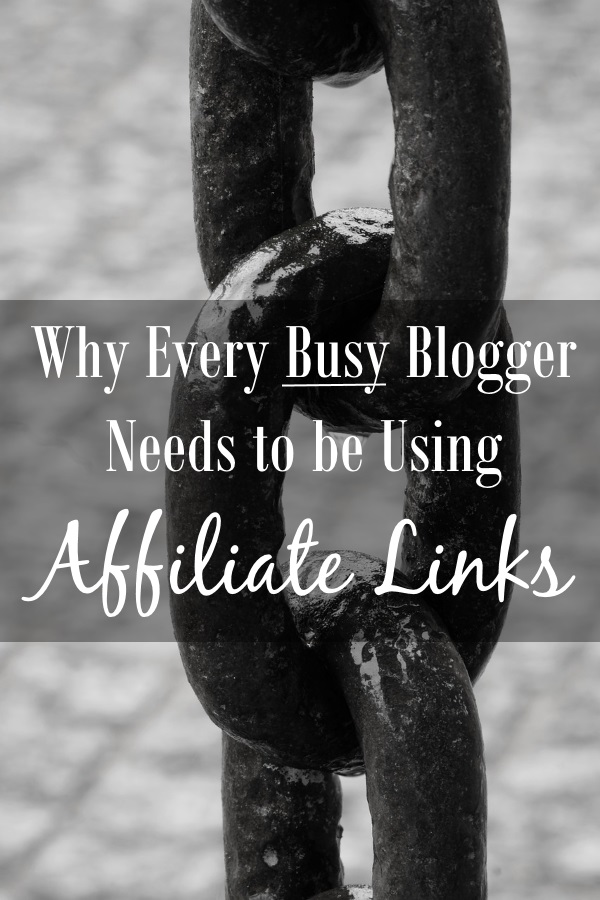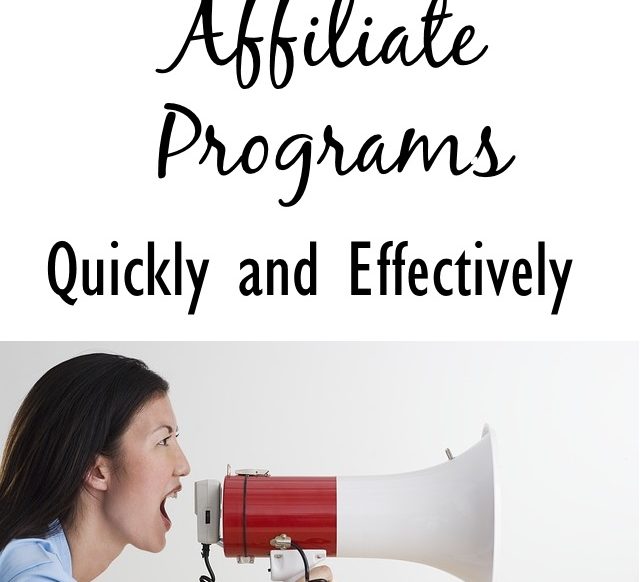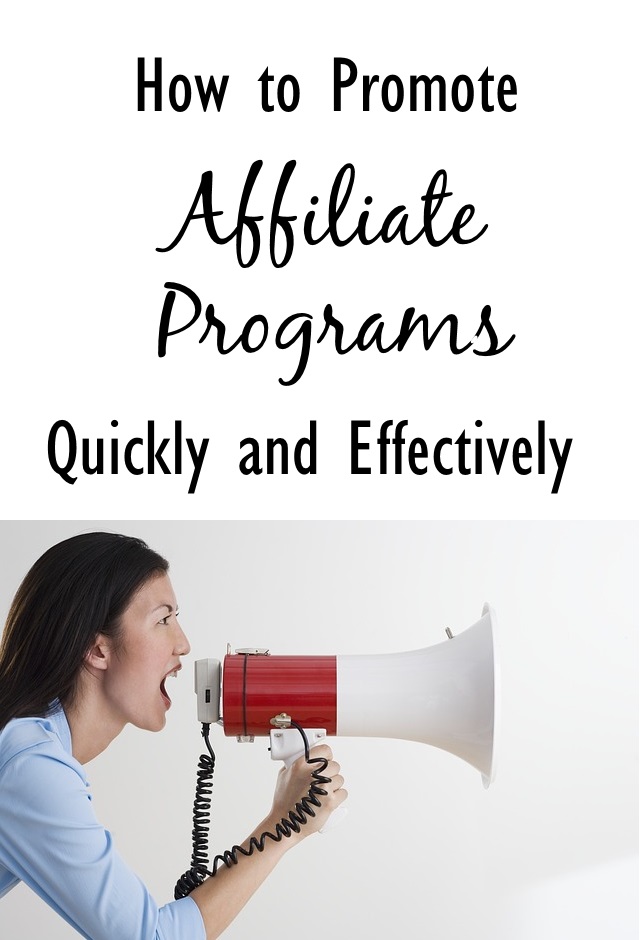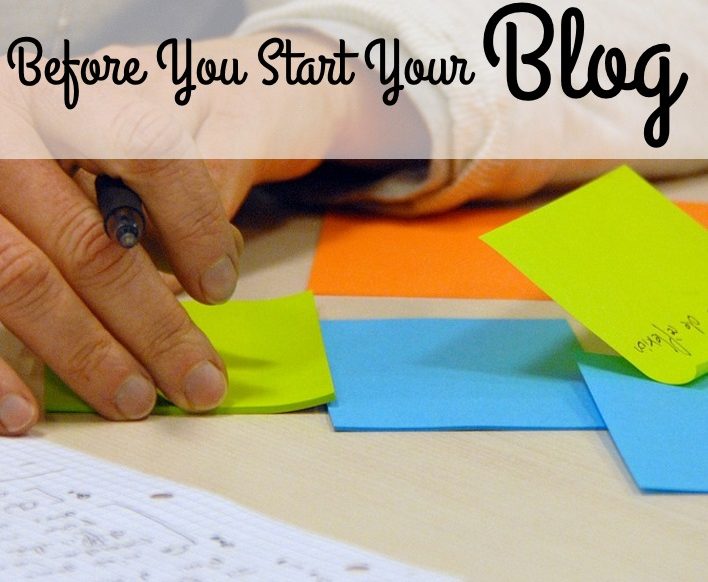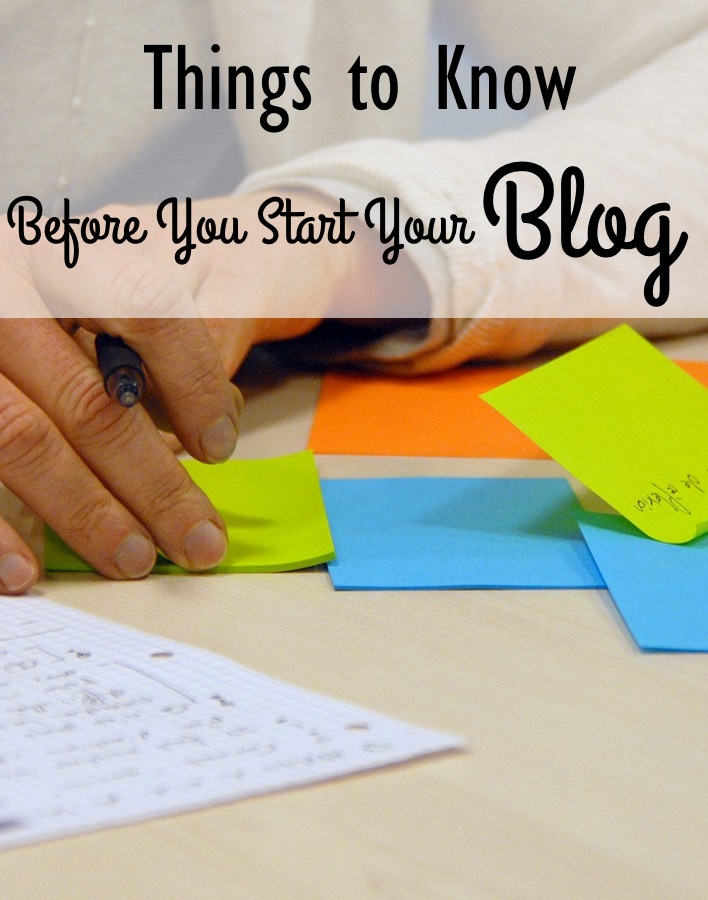Why You NEED to Be Using Affiliate Links as a Blogger
If you missed the last post about my favorite affiliate companies – the ones I've found to be easy to promote and high-paying – you really should check that out.
But in this post I want to explain why every blogger who's trying to maximize their time NEEDS to be promoting affiliate links.
1. Quick posts on social media (takes maybe a minute to grab a link from Amazon?) perform really well. A brand new blogger might earn 50 cents from that link. If you have a large social media following, you can earn $10 or more. For 1 minute of work people! If that's not maximizing your time I don't know what is! I shoot for 1 – 2 product links on my page per day. As long as I'm posting other high-quality content throughout the day, no one is going to care. Honestly, people like it because I'm helping them get a great deal on something that is relevant to them.
2. Blog posts with affiliate links in them provide passive income. Make your posts evergreen – something that can be revisited and re-shared until the end of time – and include relevant affiliate links. Do you blog about fun kids' activities? Tell people where you got the supplies, or link to your favorite brand of markers, or whatever. Every time that post gets re-shared on social media, you've got a whole new set of potential clickers on your affiliate links. Passive income is the most time-efficient way to earn that I know of!
If you're trying to earn blog income on a minimal amount of time, you NEED to be using affiliate links!
What would you add? Are there any other ways you've found to earn with affiliate links AND maximize your time?
How to Promote Affiliate Programs Quickly and Effectively
Now that you've signed up to some affiliate programs that you think will be a good fit for your blog, it's time to start promoting them.
But how do you promote merchants without spending forever doing it?
And how do you actually get people to buy what you're promoting?
1. Promote only what you love and use.
Don't try to sell things to your readers just to try to make money. No one likes to be “used” and you will only turn your readers off if you are constantly pushing products at them.
Just talk naturally about your real life. If you had some type of problem and were able to solve it with a particular product, let your readers know about it. They will appreciate the genuine recommendation and will have no reservations about using your affiliate link if they decide to buy that product.
2. Skip the sidebar ads.
When is the last time you clicked a sidebar ad? Exactly. You are not going to have tons of people buying stuff through your sidebar ads. Putting them up only clutters up your blog. (Use that space for ad network ads where you will get paid according to views rather than according to clicks.)
3. Post reviews of things you like and that you think your readers would want to know about. Be authentic and let your blog and social media communities truly be a community.
For example, I've posted a number of times on social media within the past few months the frustrations I'm having with trying to find a natural hair-care routine that doesn't leave my hair feeling greasy. My readers are joining in the conversation and getting involved with my life.
Soon I'll be putting up a blog post announcing that I finally figured out a routine that works. I'll be telling which products worked for me and including my affiliate links. I won't be saying “Buy this!” I'll be serving my readers, and in return they will follow my recommendations because they know I truly care about helping them.
4. Include affiliate links in your evergreen posts.
An evergreen post is a post that will always be relevant and you can re-share it over and over throughout the years.
For example, I've written a post about How I Get My Babies to Sleep Through the Night, and it gets re-shared over social media all the time. Within that post I mentioned a book that was helpful and made sure to use my affiliate link.
Notice what I did? I mentioned the book in a post that was meant to be helpful to my readers. I didn't make the post all about the book. What do you think is going to get more exposure and social shares? A post that says “Buy this!” or a post that solves a problem for people?
5. Share affiliate links over social media.
There is nothing wrong with sharing affiliate links over social media. Just like with your blog posts, be authentic. Don't share for the purpose of getting people to buy. Share for the purpose of serving your readers.
On Facebook, I have found that a “teaser” type post is effective because it gets people to click out of curiosity. The more clicks, the more people Facebook shows the post to. You are not trying to “trick” your readers to be shady, you are just trying to play Facebook's crazy game, okay?
So for example I might post on my Facebook page, “I'm so excited to have found a natural shampoo that doesn't make my hair all greasy! I've been searching for something like this for months!” Then I will leave my affiliate link with no Facebook preview so that readers will click to see what the product is. Always include proper disclosure for legal reasons. Putting (affiliate) in parentheses at the end of your post is sufficient.
6. Post sales.
People always want to save money, so mentioning sales on products you know your readers like is always effective.
7. Promote free stuff.
Remember that you get commission off ANY purchase made from Amazon within 24 hours of someone clicking your link. So you can direct them to free eBooks, which they are all too happy to grab. Then if they end up ordering something else within 24 hours you get the commission on that.
Other freebies to promote are companies that offer free trials of their product (be very upfront with your readers and make sure they know that they will need to cancel their trial or they will be charged).
If it fits your niche you can also promote things like survey companies where your readers can sign up to take surveys and earn money. It's a win-win. They earn money when they do the surveys. You earn money when they sign up.
8. Use affiliate links anywhere on the web as long as you are being authentic and as long as doesn't violate any of the rules of the community you are in.
For example, I'm in some homeschool groups on Facebook. If I am genuinely involved in the community, being helpful and engaging in discussions, the admins have no problem if I use an affiliate link as an answer to a question every now and then. So if someone asks people's opinion of the best math curriculum I could give them my honest answer and use my affiliate link for that curriculum.
9. Focus your efforts on the highest paying offers. Instead of constantly promoting a $3 item where you earn a 6% commission (18 cents), why not focus more on promoting a free Craftsy class where you earn $5 per sign up?
10. Post offers that are a tiny bit outside your niche. The more bloggers in your niche that are promoting something, the harder it is for you to sell to your readers. Chances are your readers have seen the same product, sale, etc. on other blogs that are similar to yours and for each blog that posts the same offer, the chances of it being purchased through your blog goes down a little bit.
For example, I love to promote the Ultimate Homemaking Bundle when it comes around, but there are TONS of other homemaking blogs that are posting the same offer, making it harder to sell as many because the offer is spread so thinly between all the blogs. But if I were to pick up on a healthy living summit that all the big healthy living blogs are posting about, I could promote that to my readers and a great deal of them would not have heard of it because they don't follow a lot of healthy living blogs. The offer is not irrelevant to my blog, but it's not being plastered everywhere by other homemaking blogs, making me one of the only people who is promoting that offer to that particular audience. It's a whole lot easier to sell because there's not a lot of competition from other bloggers in my niche.
By following these principles, you can promote affiliate programs with hardly any additional effort. Focus on great content and serving your readers and work your affiliate links in naturally. You will be surprised how quickly your earnings can add up!
(Note: if you are a new blogger you can follow these same principles. Sure, the more traffic you have, the greater your sales will be. However, if you are authentic and are aiming to serve your readers, you will find that they will trust your recommendations and buy through your links.)
Update: I knew I would forget something. Here's another one to add to the list. Pinterest. Pinterest is one of the MOST time-efficient ways to promote affiliate offers, especially if it's an ongoing offer. For example, when I refer people to Vitacost, they get a $10 coupon, and I get a $10 credit when they order. What I did was to write a post highlighting my favorite products to buy there and mentioning the $10 coupon they would get when they sign up through my link. Then I created a nice graphic for Pinterest and started pinning that post to as many boards as I could. I get continual traffic to that post and referrals while I sleep. Every time I place an order at Vitacost it reminds me to go back and pin my graphic again, bringing me a fresh new wave of traffic to that post and more referrals.
More Resources:
More posts on How to Make Money Blogging.
Join our Facebook group: The Busy Homemaker’s Guide to Blogging for Profit
Emails with free blogging advice from a SAHM who’s earning income while keeping her family first
Before You Start Your Blog
So you've seen my posts on how to make money blogging and you're ready to jump in and get started!
Before you go set up your blog and get to writing, it is extremely important to have a few things nailed down first.
1. What will be the main topic of your blog?
You must blog about what you are passionate about. What can you talk about for hours and never get tired of it? Could you blog about your topic every day and still find new ideas to post? Don't start a blog just to earn money. Blog because you love what you are writing about. You will NEVER make money from blogging about something you don't love. (Okay, never is probably a little strong, but it will always be an uphill battle.)
2. Supporting topics
What will be the supporting topics under your main topic? Your blog is like a house. It needs a foundation (your main topic). Then it needs some walls to give it structure.
So for example, my blog's main topic is “Christian Homemaking”
Now, let's narrow that down a little more and break it up into “Housekeeping”, “Family” “Healthy Living” and “Faith”
Okay, let's break it down one more time.
“Housekeeping” can be broken down into “Cleaning”, “Organizing” and “Home Decor”.
“Family” can be broken down into “Marriage” “Motherhood Encouragement” and “Kids Activities”
“Healthy Living” can be broken down into “Recipes” “Physical Fitness” and “Healthy Living Tips”
“Faith” can stand alone.
Are you going to have a recipe blog?
Break it down into “Main Dishes” “Side Dishes” “Desserts” etc.
Then break “Main dishes” down into “Beef” “Chicken” “Slow Cooker” etc.
You need to decide on the overall structure of your blog before you ever start. This will put you WAY ahead of the game when you do start since you can choose your blog's layout and set up the navigation correctly from the get go.
If you don't you'll end up with a disorganized mess of posts that will take you HOURS to go back and clean up.
3. Title
You need to put some thought into the title of your blog. It needs to be memorable and relevant. People should have an idea what your blog is about just by the title. People won't want to visit your organizing blog if it's named “Thoughts from Rebecca”. They have no clue who Rebecca is or what her thoughts are about. Name your blog “Organizing with Rebecca” instead.
Keep it short. The longer your title the harder it will be for people to remember.
4. Domain Name
When choosing your title, make sure it is something for which the domain name is available. Your domain is your “address”. (www.mycoolblog.com) If someone already has www.mycoolblog.com taken you don't want to name your blog My Cool Blog. You need your title and your domain name to match. If you tell someone you blog at “My Cool Blog” they are going to assume that www.mycoolblog.com is where you blog and type that in when they're looking for your great content. Only they'll have the wrong blog.
You can check to see if the name you're wanting is available here: https://www.checkdomain.com/
5. Social Media accounts.
If you are going to have a successful blog, you will need to have social media accounts. You cannot get traffic to your blog without being on social media. At minimum, that includes Facebook and Pinterest, but it would be great to be on Twitter and Instagram too.
You need to pick a blog name that is available on all the social media accounts too. You should always use the same name everywhere you go on the internet.
My blog is imperfecthomemaker.com. If you look for me on Facebook, my page is Imperfect Homemaker. If you look for me on twitter, I'm @imperfecthome. Pinterest is MaryEllen (ImperfectHomemaker) and Instagram is imperfecthomemaker.
People need to know who you are wherever you go.
So before you pick your blog title, make sure that account name is available on all the social media sites.
That will give you plenty to think on and get organized by the time I walk you through the how-to's of actually setting up your blog.
Follow these instructions and you will be way, way, WAY ahead of the game from where most bloggers start. Trust me, okay?
More Resources:
More posts on How to Make Money Blogging.
Join our Facebook group: The Busy Homemaker's Guide to Blogging for Profit
Emails with free blogging advice from a SAHM who's earning income while keeping her family first:

